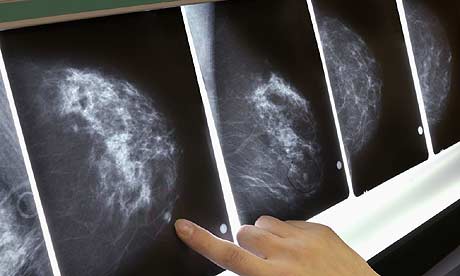David Batty and agencies
guardian.co.uk,

Mammogram scans for breast cancer. Photograph: Lester Lefkowitz/Getty
Health campaigners today called for a Europe-wide ban on man-made chemicals found in cosmetics and pesticides to help cut rising rates of breast cancer.
A report published today warns that cases of the disease can only be reduced by removing hormone-disrupting man-made chemicals from a range of household products.
The study by Professor Andreas Kortenkamp, the head of toxicology at the University of London's school of pharmacy, states: "We will not be able to reduce the risk of breast cancer without addressing preventable causes, particularly exposure to chemicals."
The report is being studied by MEPs in Brussels who are considering whether Europe-wide legislation could help to halt the growing incidence of the disease, cases of which have risen by as much as 50% in some European countries in the past 20 years.
The CHEM Trust, which jointly commissioned the review, said the report's findings came at a time when breast cancer was reaching "epidemic" proportions.
The charity's director, Elizabeth Salter Green, said: "There is a misconception that breast cancer is an inherited disease and therefore inevitable. This is a quite simply a myth: most cases of breast cancer are acquired over a woman's lifetime, and so most are preventable."
She urged MEPs to "wake up to what needs to be done" and ban the chemicals identified as increasing the risk of breast cancer.
The Health and Environment Alliance, an environmental pressure group, urged the European parliament to tighten controls on chemicals in pesticides and cosmetics ingredients.
Its executive director, Genon Jensen, said: "Several man-made chemicals should be removed from the market and replaced with less harmful substitutes. Such action could reduce the suffering of millions of women."
About one in 10 women will develop breast cancer, according to World Health Organisation figures.
Around 200 international scientists, including Kortenkamp, signed the Prague Declaration in 2005, which raised concerns about the cancer risk posed by everyday chemicals including some pesticides, flame retardants, cosmetic ingredients and medicines.





No comments:
Post a Comment